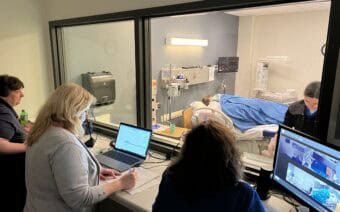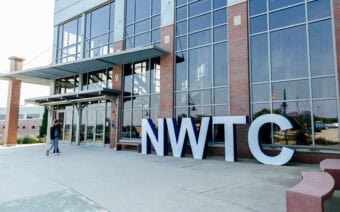
June 17, 2024
NORTHEAST WISCONSIN – Scott Stump, CEO of the National FFA Organization, said the agricultural industry today is much different than the agriculture industry of yesterday – a pattern that will continue to evolve in the days, months, years and decades to come.
Learning what that means, Stump said, is crucial to the future of the industry and the world.
“It is critical that agricultural educators and students are not just keeping pace but are setting that pace,” he said. “Many of our students in (FFA) will not enter the profession for another five to six years, depending on what they do post high school, and we need to be showing them where agriculture is going to be or will potentially be, versus just continuing to show them where agriculture is at.”
This is important, Stump said, because the young people of today will be the leaders “who are going to change the world.”
“And to do that, they need to be on the cusp of the possibilities,” he said.
FarmBeats for Students
All of this, Stump said, sparked an initiative started through a partnership between the FFA and Microsoft called FarmBeats for Students – a program that introduces modern agriculture techniques to today’s learners by providing affordable hardware that can be used for hands-on learning experiences in precision agriculture.
Stump said FFA’s partnership with Microsoft has been a game changer.
“Historically, would you have thought a partnership between Microsoft and a youth organization in agriculture (would work)?” he said. “Most people would say, ‘no.’”
However, Stump said, this partnership and others like it are critical when looking at the future of the equipment and technology now being deployed within the agriculture industry.
This, he said, includes autonomous tractors already being utilized and those on the horizon.
“(It also includes) precision farming equipment, like the John Deere See & Spray that has eyes on the front of the spray beam that can identify if this is a weed or a plant it wants to keep and immediately, in a fraction of a second, makes that decision through AI, and says ‘okay, I know what that is and yes, I’m going to spray’ – all while going 30 miles an hour down the field,” he said.
The agriculture industry’s needs, in terms of emerging technologies, Stump said, are two-fold.
“No. 1, we need the individuals who are going to expand, develop, innovate and create a new set of technology beyond even that,” he said. “For the second part, we need techs who aren’t afraid of that and can dig into a sprayer boom that has more computing power than one of the largest computers 10 years ago, and can understand what it’s doing – collecting information, analyzing that information and using it then to make a decision or solve a problem.”

Integrating that methodology into their thinking processes, Stump said, is a critical aspect of the industry’s future.
Exposure, he said, is a key component of that.
Stump said as the country’s top school-based, youth leadership development organization, FFA takes it upon itself to transform the lives of middle and high school students through a unique combination of classroom curriculum, experiential work-based learning and leadership/life skills.
“We have about a million students across the nation (in FFA) – fifth grade through seniors in high school,” he said. “With that footprint, we have a responsibility to ensure (students are) getting exposure to education about the potential of artificial intelligence (AI), data analytics, data capturing and using it to solve problems. That’s what FarmBeats allows our students to do.”
The program’s learning progression, Stump said, enables students to easily see the impact of modern tools and the opportunities within agriculture.
“This allows students to tap into AI, sensors and other technologies to better understand their crops and help them grow more efficiently,” he said.
As the climate continues to shift and change, Stump said there will be a need to look at hundreds of thousands, if not millions, of satellite photos to track that impact and adjust practices as needed.
“Our fifth graders who started last fall in agriculture education are going to be about 37 in 2050 when we have another billion people on the planet,” he said. “I am hoping they get the skills needed to still feed us all and sustain the planet in the process.”
Through the FarmBeats for Students program, Stump said students build a garden monitoring system and learn about AI, data analysis and the Internet of Things (IoT).
“It’s a little micro bit – they call it – but it’s a little computer board that has computer sensing equipment you can attach to it,” he said. “Students can check crops’ soil temperature, moisture content and sunlight exposure.”
Thanks to the technology from Microsoft and the curriculum designed by FFA’s educational resources, Stump said it’s easy for agriculture teachers to “plug and play” the program into their classes.
“When students capture data, they are looking at data, and it creates questions in their mind like, ‘what else can I do with this?’” he said. “‘Could I control a greenhouse operation with this technology?’ Absolutely. ‘Could I have different decision-making power in a large farming operation with a 160- or 300-acre field?’ Yes, you can.”
Stump said not only does it “invite them to be a part of the solutions of the future,” it sparks ideas for future career paths that are more interdisciplinary.
“It’s no longer, ‘I’m in ag or I’m in IT,’” he said. “The future is going to be a blend of all of these areas.”
Stump said it’s important for students to see the complexity and potential of the agriculture industry.
“Exposing them to the tools that will transform that future and getting them interested and asking questions about them (is important), because in asking those questions, it will potentially define their future path,” he said.
Regional trainings
To arm teachers throughout the state with the knowledge and know-how of the program, Stump said the FFA is holding a training session in Oshkosh June 23 with 16 FFA educators who will be rolling out the FarmBeats program in their classrooms next fall.
“Our teachers who have never been, for the most part, trained in coding, or had to work with, in essence, a little motherboard – the training gets them past the hesitation, gives them confidence so when they step into the classroom this fall, they can hit the ground running,” he said. “They will share this with students in a way that will open students’ minds with the possibilities of the tools they can use to solve problems in the future.”
Opens the door
Stump said not only does FarmBeats help inspire current ag students, but it also helps attract students who may not have a previous connection with the industry.
“It is opening the door for students who maybe haven’t had experiences with agriculture,” he said. “Each generation, we step a little farther away from the typical agriculture connections that most people (in the industry) had growing up long ago.”
Stump said he thinks this is especially true with Generation Z and Generation Alpha.
“I think (these generations) are born looking for a problem to solve, which is exciting,” he said.
Using the tools of FarmBeats, Stump said, inspires students to ask the question: “What else could I analyze using this technology – whether it be in natural resources, environmental sciences or the direct production of plants and animals – how can we use this data to do work better.”

FFA’s continued efforts to share curriculum and programs, like FarmBeats through its partnership with Microsoft, provides students with tools today that many before them would have benefited from.
“More students can now find their path – whether it be a computer science degree that has a lens and a focus specifically within agriculture,” he said, “or an agribusiness or an agro science degree that uses applied technology differently to solve the big problems we’re going to face around water and food supply and doing it economically – ensuring we can have soil health that will ensure long term food production.”
Strong support
Stump said the feedback the FarmBeats program has received thus far, across the board – from students and teachers to corporate partners to equipment providers to harvesters – has been tremendous.
“All of those industries need individuals who are thinking with a problem-solving brain of collecting data, analyzing it and solving problems at the end of the day – and using technology to do that in ways we couldn’t do before,” he said.
This year, Stump said, has been one of building.
“Building on what we learned from the initial rollouts a few years ago – because we started in that time of COVID-19 and have had trainings since then,” he said. “But this the first year of a re-launch, with Microsoft’s help of different technology that is more accessible across all platforms and schools.”
The re-launch, Stump said, also included the redo of the program’s training curriculum.
“The one here in Wisconsin is one of the first ones and begins the new rollout of the trainings across the country,” he said.
Stump said the goal is to make sure that any teacher who wants to has access to “embed within the program, AI and data analytics, in a way that invites students to see the connection between it and agriculture.”
More information about FarmBeats for Students can be found at ffa.org.
 Local artist inks contract for private studio in Appleton
Local artist inks contract for private studio in Appleton The future of sustainable energy looks to alternative materials
The future of sustainable energy looks to alternative materials








